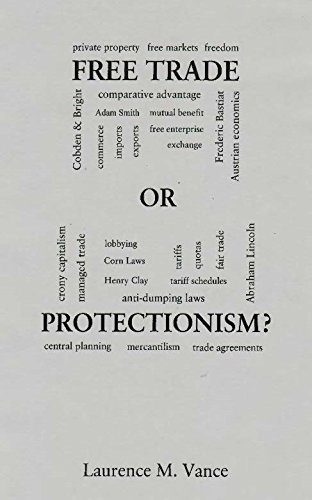In the age of Trump’s protectionism, economic nationalism, and ignorance and incoherence on trade, some conservatives have begun to go beyond legitimate criticisms of government-managed trade agreements and the World Trade Organization (WTO) and attack free trade itself.
The most ridiculous of their arguments against free trade is a classic guilt by association argument: Karl Marx believed in free trade. This is the most ridiculous argument ever against free trade.
Marx said he favored free trade because “it breaks up old nationalities and carries antagonism of proletariat and bourgeoisie to the uttermost point.” But “certainly it would be unfair to tar the bulk of free-traders with Marxism.” Then why do it? Did Marx favor free trade because he was a capitalist? Did Marx favor free trade because he was a libertarian? Did Marx favor free trade because he believed in the free market? Did Marx favor free trade because he was a disciple of Adam Smith and David Ricardo? Did Marx favor free trade because he believed in free enterprise? Did Marx favor free trade because he believed in freedom? Did Marx favor free trade because he was opposed to government intervention in the economy? Did Marx favor free trade because he believed in the benefits of competition?
Of course not.
 The Free Society
Best Price: $13.55
Buy New $17.54
(as of 04:55 UTC - Details)
The Free Society
Best Price: $13.55
Buy New $17.54
(as of 04:55 UTC - Details)
On January 9, 1848, Marx spoke before the Democratic Association of Brussels on the topic of free trade. Here is the full context of the above Marx quote on free trade:
But, generally speaking, the Protective system in these days is conservative, while the Free Trade system works destructively. It breaks up old nationalities and carries antagonism of proletariat and bourgeoisie to the uttermost point. In a word, the Free Trade system hastens the Social Revolution. In this revolutionary sense alone, gentlemen, I am in favor of Free Trade.
At the end of Marx’s undelivered speech to 1847 Free Trade Congress in Brussels, he said this about free trade:
We are for Free Trade, because by Free Trade all economical laws, with their most astounding contradictions, will act upon a larger scale, upon a greater extent of territory, upon the territory of the whole earth; and because from the uniting of all these contradictions into a single group, where they stand face to face, will result the struggle which will itself eventuate in the emancipation of the proletarians.
According to Frederick Engels, the reason alone that Marx declared in favor of free trade because it was “the economic medium in which the conditions for the inevitable social revolution will be the soonest created.”
 Free Trade or Protecti...
Buy New $5.95
(as of 04:55 UTC - Details)
How deceitful of protectionists to associate modern free traders with Karl Marx.
Free Trade or Protecti...
Buy New $5.95
(as of 04:55 UTC - Details)
How deceitful of protectionists to associate modern free traders with Karl Marx.
It is in fact protectionists who are Marxists.
Conservatives rightly criticize the centrally planned economies of communist countries such as the Soviet Union, Cuba, Venezuela, and North Korea, as well as the socialism and extensive government intervention in the economies of European countries. But when they call for protectionist trade policies to be undertaken by the U.S. government, they are actually calling for Soviet-style central planning by the U.S. government and its economists and bureaucrats.
All forms and levels of protectionism require central planning. Government economists and bureaucrats must determine which industries should be protected, which countries should have their exports restricted, how to erect a particular trade barrier, which items should be subject to tariffs, how much of a tariff to impose, how long the tariff should remain in place, what exemptions should be given, which goods should be subject to import quotas, what the magic number of the quota should be, how often to reevaluate the need for some degree of protection, the course of action to take when targeted countries retaliate, and how many economists and bureaucrats to employ to figure these things.
And of course, all of this presupposes that the government is capable of calculating the “correct” amount of protection on the “right” goods.
Protectionism should be rejected just like wage, price, and rent controls, minimum-wage laws, usury laws, price-gouging laws, and other forms of government central planning.






